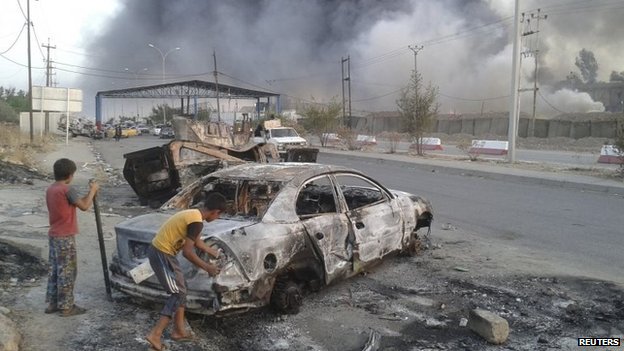
As many as 500,000 people have been forced to flee Iraq’s second city of Mosul after Islamist militants effectively took control of it. Troops were among those fleeing as hundreds of jihadists from the ISIS group overran the city and much of the surrounding province of Nineveh. Iraqi PM Nouri Maliki responded by asking parliament to declare a state of emergency to grant him greater powers. The US said the development showed ISIS is a threat to the entire region. ISIS – the Islamic State of Iraq and the Levant – is an offshoot of al-Qaeda which now controls considerable territory in eastern Syria and western and central Iraq, in a campaign to set up a militant enclave straddling the border. ‘Chaotic situation’ Residents of Mosul said jihadist flags were flying from buildings and that the militants had announced over loudspeakers they had “come to liberate” the city. “The situation is chaotic inside the city, and there is nobody to help us,” said government worker Umm Karam. “We are afraid.” ISIS in Iraq The Islamic State of Iraq and the Levant (ISIS) has 3,000 to 5,000 fighters, and grew out of an al-Qaeda-liked organisation in Iraq ISIS has exploited the standoff between the Iraqi government and the minority Sunni Arab community, which complains that Shia PM Nouri Maliki is monopolising power It has already taken over Ramadi and Falluja, but taking over Mosul is a far greater feat than anything the movement has achieved so far, and will send shock waves throughout the region Many police stations were reported to have been set on fire and hundreds of detainees set free. “The army forces threw away their weapons, changed their clothes, abandoned their vehicles and left the city,” Mahmud Nuri, a resident fleeing Mosul, told the AFP news agency. The BBC’s Jim Muir says the Iraqi security forces appear to have nothing to fight back against the ISIS militants. Hundreds of cars carrying Mosul residents caused a giant traffic jam outside the nearby city of Erbil There are concerns over how Kurdistan will cope with the influx of people US State department spokeswoman Jen Psaki said the situation in Mosul was “extremely serious” and that the US supported “a strong, co-ordinated response to push back against this aggression”. A spokesman for UN Secretary-General Ban Ki-moon said he was “gravely concerned” at the situation. But our correspondent says everything that has happened in Syria indicates that the West would not want to get involved in another Middle East quagmire. Footage shows ISIS militants driving through the streets of Mosul Heading to Kurdistan Sources have told BBC Arabic that the tens of thousands of fleeing refugees are heading to three towns in the nearby region of Kurdistan where authorities have set up temporary camps for them. Kurdistan Prime Minister Nechirvan Barzani issued a statement appealing to the UN refugee agency for help. Security sources told the BBC that fierce fighting had erupted between Iraqi forces and ISIS fighters in a town called Rashad near Kirkuk, south-east of Mosul. There were also reports that jihadists had seized other areas of Kirkuk and two towns in the neighbouring Salaheddin province. In a televised announcement, Mr Maliki said that security forces had been placed on a state of “maximum alert”. He also said he had asked parliament to declare a state of emergency – which would broaden arrest powers and allow curfews to be imposed – and a “general mobilisation” of civilians. Nouri Maliki: “The seriousness of the situation needs swift measures” Parts of Ramadi, the capital of Anbar province, and much of the nearby city of Fallujah have been under the control of ISIS and its allies since late December. ISIS has also been informally controlling much of Nineveh province for months, and in the past week has attacked other areas of western and northern Iraq, killing scores of people. The Iraqi government is struggling with a surge in sectarian violence that killed almost 800 people, including 603 civilians, in May alone, according to the UN. Last year, more than 8,860 people died. Source : BBC

